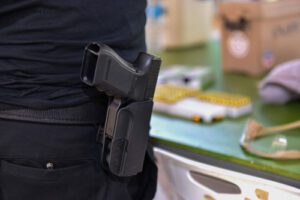 Judge Bumb continued: Absent a concession by Defendants that they do not intend to enforce the newly enacted legislation, Plaintiffs have averred credible threats of prosecution. Indeed, as Plaintiffs point out, every indication is that the State of New Jersey intends to prosecute any violation of these laws to the fullest extent. [Docket No. 28 (“Pls.’ Reply”) at 5 (explaining that the law does not require petitioner to expose himself to actual arrest or prosecution to challenge a statute as unconstitutional because “what’s more significant” is the fact that Defendants do “not disavow the possibility of prosecution”) (citing Artway v. Attorney General, 81 F.2d 1235, 1248 (3d Cir. 1998)).] As noted above, at oral argument, the Court explored the threat of prosecution and queried whether Defendants would agree not to prosecute a violation under these provisions of the new legislation, but the Defendants would not agree that they would not prosecute Plaintiffs for violations of the newly enacted legislation. [Tr. at 27.]
Judge Bumb continued: Absent a concession by Defendants that they do not intend to enforce the newly enacted legislation, Plaintiffs have averred credible threats of prosecution. Indeed, as Plaintiffs point out, every indication is that the State of New Jersey intends to prosecute any violation of these laws to the fullest extent. [Docket No. 28 (“Pls.’ Reply”) at 5 (explaining that the law does not require petitioner to expose himself to actual arrest or prosecution to challenge a statute as unconstitutional because “what’s more significant” is the fact that Defendants do “not disavow the possibility of prosecution”) (citing Artway v. Attorney General, 81 F.2d 1235, 1248 (3d Cir. 1998)).] As noted above, at oral argument, the Court explored the threat of prosecution and queried whether Defendants would agree not to prosecute a violation under these provisions of the new legislation, but the Defendants would not agree that they would not prosecute Plaintiffs for violations of the newly enacted legislation. [Tr. at 27.]
Finally, Defendants argue that Plaintiffs have failed to demonstrate traceability or redressability as to their claims. Specifically, they argue, Plaintiffs have “adduce[d] no evidence that the proprietors of entertainment venues, restaurants, and other private establishments would not have allowed Plaintiffs to bring firearms into those locations were it not for Section 7(a)(24).” [State’s Br. at 14.] It is an illogical argument this Court explores in greater detail below: in order for Plaintiffs to demonstrate redressability they must first give up their right to bear arms, and then go on to the private property to inquire as to the proprietor’s intent. If the proprietor does not expressly authorize the presence of firearms, then the Plaintiffs now have the answer they needed, but by that time they have violated the law and exposed themselves to prosecution. This convoluted scenario demonstrates how the challenged legislation is directly traceable to the Plaintiffs’ complained of injury.
It would have been interesting if the defendants did disavow their intent to prosecute violations of the statute in order to prevail at this hearing. Under that scenario, they would have undermined the Legislature’s authority to enact the law. However, they would have arguably allowed for the statute to be enforced at a later date.
